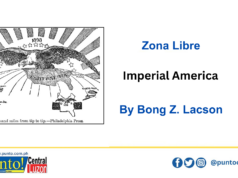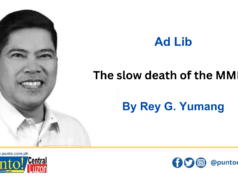Finally, President Bongbong Marcos has shown an unmistakable open-mind, slightly but evolving, about the truth, not necessarily about the facts where the devil is said to be on the money and good at mixing them up. It might have taken him more time, shuttling the globe, and politics to arrive to it and become a reluctant convert.But he has finally come to the beginning of his version of either the road to Damascus or the road to Emmaus.
So be it. It’s a definitive improvement, and could be good for the country he leads in the long run. The long run could mean more than six years with a possible charter change waiting in the wings ,and the ever-present external threat from China as a viable political fodder to bolster his unspoken plan for the future.
Let the world and his people know that he has agreed to the version of past events, which Bonaparte said is history agreed upon by people, maybe not all for one reason or another, but by many, here,there and everywhere, to quote an old song.
In a speech before a think tank in Washington in the course of his recent state visit to the United States, PBBM agreed to what most generally believed in the Philippines :that there were human rights abuses in the war-on-illegal drugs of his lamented or unlamentedpredecessor. He may not agree on the 6,000 plus victims as officially acknowledged or to the bigger number of more than 30,000 as determined unofficially by human rights groups. But yes, PBBM agreed, the human rights abuses, particularly the documented cases filed before the International Criminal Court, happened.
His public admission, whether he likes it or not,has only validated the cause celebre of the ICC to investigate the alleged crime against humanity against former President Rodrigo Duterte and some officials, especially from the Philippine National Police. PBMM has opposed the ICC probe, and his political allies have since sung like a choir. His admission is the best moral argument vis-à-vis their collective position opposing the ICC’s position.
That opposition becomes increasingly untenable.
PBBM’s change of heart or mind could have been triggered by recommendation by a team headed by Secretary Benhur Abalos that four police officials, two generals and two colonels, should be dismissed from the service for linked illegal drugs by accepting their courtesy resignations. Dozens more will still be investigated whether their resignations will be accepted or not.
One take-away from PBBM’S admission could be to impress the ICC that his administration is willing and able to look into the alleged crime against humanity without ICC having to intervene in a domestic issue. His eventual decision on the four police officers could be a game changer in more ways than one. Extra-judicial killings related to enforcement of rules versus illegal drugs will b e a thing of the past. Prosecution of abusive police officers, past and present, in the war against drugs should convince the ICC that PBBM walks the talks. It will also encourage the judiciary to be more pro-active in its role against human right violations where it has looked the other way in the past.
There is no denying that the Philippine presidency has gained a new image before the world under PBBM. His recent visit to the US attests to it, especially when he was made the first president to be honored at the Pentagon. That was more than symbolic: it substantially boosts the Philippines military and political clout as a US ally.
The powerful symbol can be as powerful as a tremendous political leverage at home. Right now, social media is abuzz with intrigues that PBBM has already thrown his predecessor under the bus with his admission human rights abuses were committed under the latter’s watch . Decisions have their unintended consequences. PBBM may have felt he has never been more powerful as the highest official of the land. He can even look Chinese President Xi JinPing in the eye and will not blink as far as the entire West Philippine Sea is concerned. Duterte may become politically expendable given the trend of events.
At the rate he is going, he might just admit that the so-called golden age in Philippine history in his father’s time was a bit exaggerated. Like his admission of abuses during Duterte’s war against drugs likened to swallowing a bitter pill, his correct view on his father’s legacy will be seen in that light. “Confession is good,” Mahatma Gandhi said. “It is like a broom that sweeps away the dirt and makes the clean surface clear and brighter”.
PBBM’s confession could also affect in a more hopeful way the government case against former Sen Leila de Lima. It is clear that, on the basis of the recantation made by various witnesses against her, De Lima has been detained for years now on lies made by coerced witnesses. De lima is among the thousands who were abused in the war against drug during the previous regime in the true sense. Her eventual liberty is one factor ICC can consider about the current administration’s willingness and competence ,indeed. to probe PBBM’s admission of human rights abuses before his time. That may or may not validate ICC’s case of crime against humanity.
In any case, his belated posture about history is the right, though delayed , step in the right direction. A new era might have just begun.





